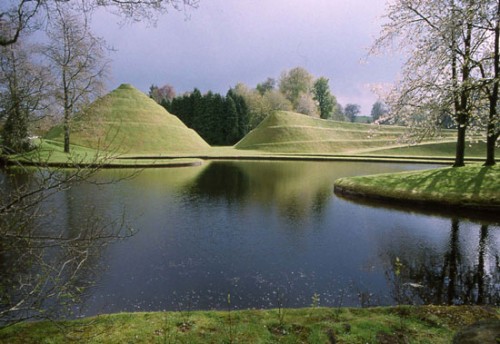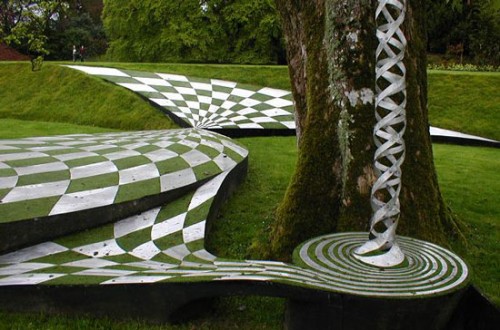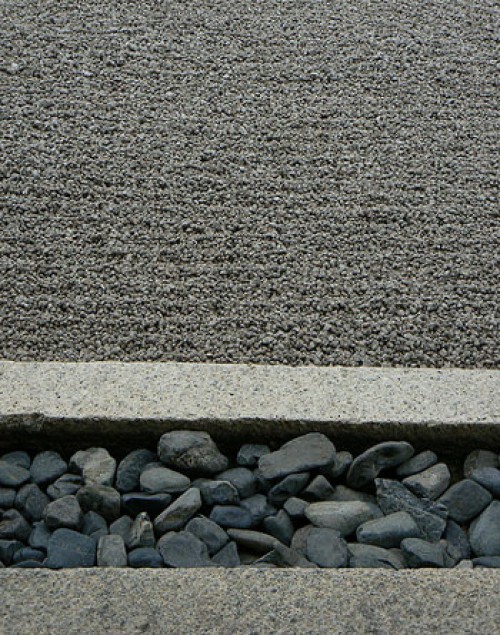
Good cosmic gardening weather – where else but Norbiton?
I have missed, once again, the Opening of the Garden of Cosmic Speculation. It is like missing a total eclipse (and so far I have missed all of those): it is a predictable, repeated, attainable happening, but somehow you never go, and another year rolls around and you don’t go yet again.
The Garden of Cosmic Speculation, to be clear, is not a cosmic happening on the usual scale but a garden in Scotland, the creation of architect Charles Jencks and his late wife Maggie Keswick. It is open to the public once a year for half a day (the first Sunday of May, I think). This is not only reasonable (it is a private garden), it is also necessary: cosmic speculation, it seems to say, happens in private, happens rarely, is hard-won.
Perhaps I will go on regularly missing it, and that will be for the best, because on the days it is open it is, so I read, teeming with people, people who like gardening. There is nothing wrong with that – I like a garden myself and occasionally do a bit of gardening. But a garden, as opposed to a gardens, is, to repeat, a private space, and liking gardens is not the same thing as liking gardening.
Gardening, it could be argued, has of late taken over the garden, just as cookery has overtaken food. This is probably to the good. Louis XIV would have been aghast at the idea that in the future everyone would aspire to be a cook or a gardener, and no one a king; it is amusing to think of him making his insane progress around the gardens at Versailles – insane because, so the story goes, the water pressure would not allow all of the fountains to be active at once, so the daft King would be shadowed by junior gardeners hiding behind hedges and creeping round the parterres, giving frantic semaphore notice to one another of his stately progress and turning fountains off and on to accommodate his preposterous notion of a proper kingly abundance. In this comedy, like something out of King Rollo, we are firmly on the side of the smirking knowing gardeners who no doubt spent most of their time puzzling over varieties and propagation or bending over spades.
Nevertheless, I would still argue that one of the primary if also privileged uses of a garden is either as an object of contemplation, or as an orderly patterned space for speculative moments. Which is why it is not abhorrent to good sense to describe this as a garden:
This is a Zen Garden, which is, I assume, a contemplative rather than a speculative space – and it is perhaps important to distinguish, for a moment, between speculation and contemplation, where speculation is a form of reflection (you reflect on something that has happened, an experiment, say), and contemplation by contrast implies that the object is present, you are held in the same time frame as the object.
Speculation, in other words, is an activity, a way of making crablike grappling progress with your thinking. Ian Hamilton Finlay, a friend of Jencks whose own garden, Little Sparta, is only thirty or so miles from The Garden of Cosmic Speculation, said that a garden should not be a retreat but an attack. An attack, that is, on conventional thinking or tired metaphor.
Of course this is an unspeculative – still less a contemplative – age. Who has the time to have a think? The best use for a garden might consequently be to garden it – Jencks himself writes that ‘some of these questions [those facing the creator of a Gardener of Cosmic Speculation] are practical, others are philosophical, and the latter may not occur to us while laying out a garden, but they are implied.’
I am pleased by the idea that philosophy might be something merely implied by what you do, day to day. And it occurs to me in this connection that gardening is paradigmatic of what in Norbiton we like to call Slow Work – the sort of work that is a doing without the imperative to have done; a form of ornamented waiting – waiting, in this case, not just for your marrow to grow, or the rains to come, but for some cosmic penny or other to drop.













What is it in human nature that renders all of us excited by the prospect of walking up a spiral pathed hill? A hill with a straight path to the top is never as alluring
In my case, that’s down to the gradient!
It’s a shame everyone’s away this week as it’s been a terrific one on The Dabbler.
Look out, incidentally, for a new Dabblerish gardening feature, hopefully coming soon.